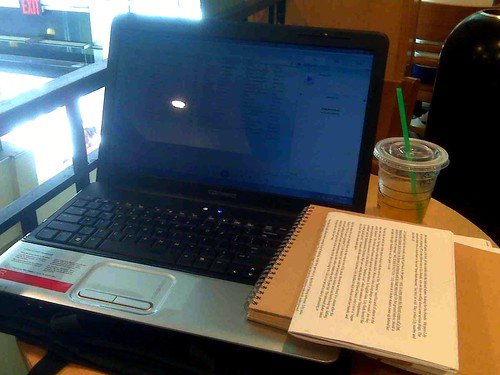I’m not sure how I got on this train of thought (probably on the subway train actually), but I was thinking about the idea of a knack–you know, having a knack for something, a facility with a specific skill. Cooking, packing for a trip, thank you notes, picking up chicks–these are things you have knacks for. I have also been thinking about the notion of talent, no doubt spurred on by the fact that I’ve been listening to Malcolm Gladwell’s Outliers on audiobook, which examines highly successful people in various fields and how they’re shaped by the “ecology” of circumstance and opportunity that surrounds them. And I’ve also just finished Danielle LaPorte’s amazing e-book on entrepreneuship, Fire Starter Sessions, in which one of the most illuminating questions was “What business are you REALLY in?” Example: you’re a travel writer, but the business you’re really in is adventure, or social justice, or sensuality, or whatever–basically, the larger value or emotion that you’re REALLY selling.
Somehow, all three strands of thought came together for me into one notion that I’ve been picking at lately, one that I keep turning in my head to make it applicable to art-making and creativity. The whole idea is that our skills in–our “knacks for”–writing, photography, design, music, or art really serve to communicate a larger emotional/spiritual/intellectual framework–a feeling or idea that we create again and again. That feeling or idea is not the by-product of our work–it’s the whole reason for it, the reason it’s memorable and loved and hated and feared and adored. This emotion, idea, the deeper work of a novel, movie, etc–that’s what people connect with. What if creating that feeling was our genuine talent, and our skills the vehicle through which we exert this?
Examples, drawn from some recent movies and books that I’ve read:
+ Christopher Nolan has a knack for filmmaking, but his talent is examining how the fracturing of time and space can fracture a self.
+ Suzanne Collins has a knack for amazing plot and tightly-wound story pacing, but her talent is really for visceral action writing.
+ Stephenie Meyer has a knack for memorable characters, but what she really has a talent for is operatic romance.
+ Don DeLillo has a eye and gift for weird detail, but what he uses it for is to create the paranoia of a media-saturated world.
+ Mary Cantwell uses beautifully spare prose in Manhattan, When We Were Young, but her talent is a nostalgic, elegant evocation of a time and place.
+ Francis Bacon had a command of paint, but his talent was for intense psychological anguish and isolation.
You could run the gamut from Artemisia Gentileschi to Louise Bourgeois to Wes Anderson and make a distinction between their knack for the medium and the talent that they used their medium to create. I’ve been thinking about this distinction between “knack” and “talent,” which is an interesting way to review my own work as well. In retrospect, I’ve done all kinds of things–video installation, screenwriting, novelwriting, blogging–but what’s at the heart of all of it? What’s the larger thing I’m trying to say? It’s also called “vision,” I guess, and I wonder how long it takes to find and develop this. I had almost wished I had thought about this more in film school, which was so strongly focused on developing our knacks for directing and screenwriting that I sometimes wonder if there could’ve been a sliver of time devoted to honing vision and talent. What would happen if we approached artmaking and creativity from this perspective–if we learned our emotional imprint first, or as much as honing our skills? What would open up in our work, our craft, our selves?


